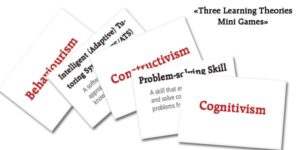Nearly ten years ago I attended a seminar about „Kinderspiel – Kinderspiele: Theorie – Empirie“ („Children’s Play and Games: Theoretical and Empirical Views“), where one possible task was to create a learning game. I was flabbergasted that the three other groups came up with – quite adorable, I have to admit – variations of games similar to „Trivial Pursuit“ for pupils: Roll a die, draw a card, answer correctly and go on. This seemed to me like an unfortunately quite realistic representation of schooling.
Depressed and feeling slightly challenged, I and a co-student went to work on a game suitable for students of pedagogy: It should be usable to give new students an overview on historic and contemporary educators, but also deliver a tongue-in-cheek view on the study of educational science in the cogs and wheels of the university.
So, here’s a serious game about historic educators, where you can cook your fellow students‘ goose while competing for the scarce ressource of books in the department’s library. Testplayers enjoyed the game and found the short descriptions, categorisations and quotes on people like Comenius, Flitner, Socrates etc. quite helpful.
You may now download the card game (german texts, 88 cards, rules, and a nifty box to store the stuff) in 300dpi-print quality. This game was my first attempt on an educational card game, a labour-of-love as well as a proof-of-concept: You know, not all learning games have to work like quiz games!
By the way: „Tiebranimes“ can be read backwards, then it spells „Homework assignment“ in german.



